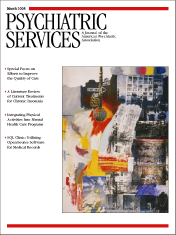Use of Child Custody as Leverage to Improve Treatment Adherence
To the Editor: In the January 2005 issue John Monahan, Ph.D., and his colleagues (1) reported on tools used in the public mental health system as leverage to improve adherence to psychiatric treatment in the community. Their work brings important attention to leverage strategies that are used even more commonly than outpatient commitment—housing, criminal sanction, and money. If their inquiry had included the child welfare system, they would likely have discovered the use of another form of leverage, that is, the threat or actual loss of custody or contact with children.
Parenthood is as prevalent among men and women living in the community who meet diagnostic criteria for mental illness, including serious mental illness, as it is among individuals who do not meet criteria (2). There are no national data on the prevalence of custody loss for these parents. Estimates, typically from studies of mothers with serious mental illness in treatment settings, range as high as 70 to 80 percent (3). These rates are consistent with or exceed those found for use of criminal sanction as leverage by Dr. Monahan and his colleagues among the study participants who had been arrested or convicted. Although no data are available on how these parent-child separations occur, child protective workers, family court judges, or family members may impose compliance with treatment recommendations as a condition for parents to maintain caregiving responsibility, to visit, or to reunite with children.
Fear of custody loss is, in fact, a significant deterrent to treatment seeking (4). Parents with mental illnesses express concern that if they disclose their parenting status or, more important, problems with parenting, treatment providers will file reports with child protective services, thereby increasing the probability that they will lose their children.
Using the loss of custody or contact with children as leverage may be a double-edged sword. Although the preservation of relationships with children may be a powerful motivator to participate in treatment, the opportunities for failure to achieve parenting goals are great. Even when parents obtain treatment for mental illnesses, substantial progress on parenting goals cannot always be made in the 12-month time frame mandated by the Adoption and Safe Families Act. Psychiatric symptoms, along with contextual variables, are related to community functioning among mothers (5); however, relationships between treatment adherence, reduction in symptoms, and improved parental functioning have not been clearly demonstrated. Evidence-based parenting interventions for adults with mental illnesses may not be available; the public mental health system does little to support these clients as parents (2). And perhaps the only stigma greater than that of mental illness is the stigma associated with failing as a parent. As one mother with serious mental illness reported, "And when they say, 'We're taking what you have left, that's keeping you alive,' … what do you think then? You figure you're a failure completely. You can't even take care of your own children. What's the sense in living?"
Dr. Monahan and his coauthors suggest that future research focus on how, whether, and with whom leverage is most effective in improving treatment adherence. The definition of leverage and the focus of research must be broadened to include the threat or actual loss of custody or contact with children.
Dr. Nicholson is associate professor of psychiatry and family medicine in the department of psychiatry at the University of Massachusetts Medical School in Worcester.
1. Monahan J, Redlich AD, Swanson J, et al: Use of leverage to improve adherence to psychiatric treatment in the community. Psychiatric Services 56:37–44, 2005Link, Google Scholar
2. Nicholson J, Biebel K, Katz-Leavy J, et al: The prevalence of parenthood in adults with mental illness: implications for state and federal policymakers, programs, and providers, in Mental Health, United States, 2002. DHHS pub no (SMA) 3938. Edited by Manderscheid RW, Henderson MJ. Rockville Md, Substance Abuse and Mental Health Services Administration, 2004Google Scholar
3. Joseph JG, Joshi S, Lewin AB, et al: Characteristics and perceived needs of mothers with serious mental illness. Psychiatric Services 50:1357–1359, 1999Link, Google Scholar
4. Nicholson J, Sweeney EM, Geller JL: Mothers with mental illness: I. the competing demands of parenting and living with mental illness. Psychiatric Services 49:635–642, 1998Link, Google Scholar
5. Bybee D, Mowbray CT, Oyserman D, et al: Variability in community functioning of mothers with serious mental illness. Journal of Behavioral Health Services and Research 30:269–289, 2003Crossref, Medline, Google Scholar



